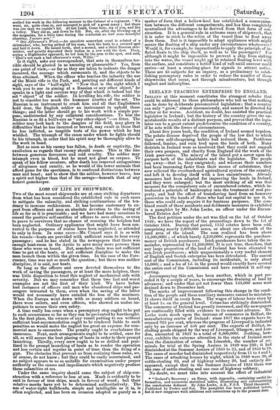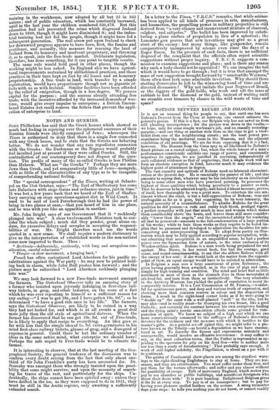IRELAND TEACHING ENTERPRISE TO ENGLAND.
IurrAND at this moment constitutes the strongest rebuke that could be addressed to those philosophers who tell us that nothing can be done by deliberate preconceived legislation ; that a country can only " grow," almost unconsciously, and cannot be directed for better or for worse. Accident, no doubt, has assisted the practical legislator in Ireland ; but the history of the country gives the un- mistakeable results of a distinct purpose, and proves that the legis- lator can to a great extent predetermine the condition of a country, if he acts with the forces of circumstances.
About five years back, the condition of Ireland seemed hopeless. The potato disease deprived the people of the low diet to which their own self-cheapening habits had reduced them. Pestilence followed, famine, and ruin trod upon the heels of both. Many districts in Ireland were so insolvent that they could not support their own paupers, and charity from England did the work of the Irish poor-rates. The misery of the island put a screw upon the purpose both of the inhabitants and the legislator. The people ran away—that is, they emigrated; and whereas their numbers had been increasing faster than their means of subsistence, they now relieved the overburdened agricultural system of the country, and left it to develop itself with a less encumbrance. Already measures had been adopted for improving the lands in Ireland, and they were enlarged ; but the most striking of all was that measure for the compulsory sale of encumbered estates, which in- troduced a principle of bankruptcy into the treatment of real pro- perty, and had the effect of transferring land from an honorary possession in the hands of those who had not capital to use it, to those who could only acquire it for business purposes. The com- bined result of these accidents and deliberate measures is exhibited in a pamphlet by Mr. John Locke, an officer under the Encum- bered Estates Act.*
The first petition under the act was filed on the 1st of October 1849; we have the report of the proceedings down to the 1st of October 1854. During that period, 1152 estates have been sold, comprising nearly 2,000,000 acres, or about one eleventh of the land area of the island. The sum realized has been above 13,500,000/. ; of which barely 2,250,000/. represents the purchase- money of British purchasers. Irish purchasers have taken the re- mainder, represented by 11,260,0001. It is not true, therefore, that any large proportion of the land of Ireland has been alienated to non-Irish purchasers ; while unquestionably a very useful element of English and Scotch enterprise has been introduced. The annual cost of the Commission, including its incidentals, is only about 15,000/. ; and a fee of ld. in the pound would exactly have covered the entire cost of the Commission and have rendered 'it self-sup- porting.
Accompanying this act, has been another, which in part pre- ceded it by a couple of years, to encourage the draining of land by advances ; and under that act not fewer than 153,000 acres were drained down to December last.
The marks of improvement following this change in the condi- tion of the people and these auxiliary measures cannot be mistaken. It shows itself in every form. The wages of labour have risen by at least is. on the general level. Crime has strikingly diminished. The commerce of Ireland has greatly increased, and the newspapers are continually filled with evidence to its constant advance. Mr. Locke rests much upon the increase of commerce in Belfast, the manufacturing centre of Ireland : since 1817 the exports have in- creased 925 per cent, whereas the progress of Liverpool is indicated only by an increase of 558 per cent. The exports of Belfast, in- cluding goods shipped by the way of Liverpool, Glasgow, and Lon- don, amounted in 1853 to a total of 8,500,000/. Nothing, how- ever, exhibits the extreme alteration in the state of Ireland more than the diminution of crime. In Limerick, the number of cri- minals for trial at the Spring Assizes in 1849 was 250; it had diminished at the Summer Assizes of 1853 to 25, and of 1854 to 19. The cases of murder had diminished respectively. from 11 to 4 and 1. The cases of attacking houses by night, which in 1849 were 30, of cattle-stealing 63, and of highway robbery 20, had entirely dis- appeared, except that in the Summer Assizes of 1854 there was one case of cattle-stealing and one case of highway robbery.
No doubt, we must take into account the effect of industrial
• "Ireland's Recovery ; an Essay, with Appendix, containing useful in- formation, and numerous statistical tables, illustrating and substantiating the conclusions deduced. By John Locke, A.B., F.S.S. Third thousand." Published by Parker and Son. The pamphlet has been published before, but it now reappears with additions and corrections up to the present date.
training in the workhonse, now adopted by all but 25 in 163 unions; and of public education, which has constantly increased,- until in the last year the children numbered 556,4'78. But this education had not prevented the crime which disgraced Ireland down to 1849, though it might have diminished it; and the indus- trial training had not fed the people, though it might have fed a subsequent generation. The real screw pat upon Ireland to cheek her downward progress appears to have been, first, the famine and pestilence, and secondly, this measure for rescuing the land of Ireland from its honorary and insolvent proprietary, and throwing it, so to speak, into the free-trade market. Deliberate legislation, therefore, has done something, for it can point to tangible results.
The same rule would hold good in other places, though the working might be less naked. In England also we have agricul- tural improvements restrained by oldfashioned practices, and those practices in their turn kept on foot by old leases and an honorary proprietorship. A free trade in land, with transfer by a simple registration, would have proportionate though not so gigantic ef- fects with us as with Ireland. Similar facilities have been afforded by the relief of emigration, though in a Less degree. We possess capital for the purpose ; and the success already attending free trade, with the incentive afforded by the increased demands of war- time, would give every impulse to enterprise; a British Encum- bered Estates Act could remove the fetters that prevent the appli- cation of enterprise to land.



































 Previous page
Previous page